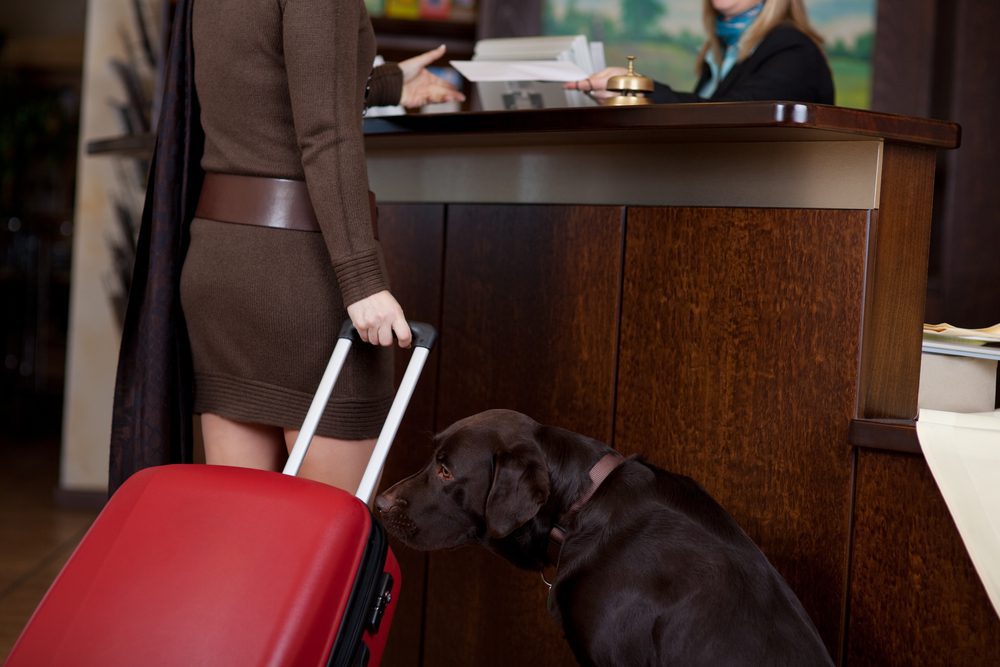Can a Hotel Refuse an Emotional Support Animal? Yes, a hotel can refuse an emotional support animal. Hotels have the right to deny accommodation to emotional support animals if they pose a direct threat to the health or safety of others, if they cause significant property damage, or if their presence would fundamentally alter the nature of the hotel’s services.
However, if the emotional support animal is a service animal that is trained to perform specific tasks for a person with a disability, the hotel cannot refuse their entry. In such cases, the hotel must make reasonable accommodations to allow the service animal to stay with its owner.
It is important for individuals with emotional support animals to check the hotel’s policies and contact them in advance to ensure compliance and a smooth experience.
What Is An Emotional Support Animal?
An Emotional Support Animal, often referred to as an ESA, is a pet that provides therapeutic support to individuals with mental health conditions. ESAs are not considered service animals and do not undergo the same training or certification processes. Their role is to offer comfort and companionship to their owners, alleviating symptoms and improving overall well-being.
For individuals with mental health conditions, the presence of an ESA can have numerous benefits. These include reducing anxiety, providing a sense of security, and offering emotional support during times of distress. ESAs can help individuals manage symptoms and improve their quality of life, allowing them to lead more fulfilling and independent lives.
However, despite the positive impact they can have, there may be instances where hotels or other establishments can refuse to accommodate ESAs, as they are not legally recognized in the same way as service animals.
Can a Hotel Refuse an Emotional Support Animal?
Here’s a concise guide on whether hotels can refuse emotional support animals:
- Legal Rights and Protections:
- Air Travel: Emotional support animals (ESAs) have rights and protections when flying on airplanes.
- ESAs are safeguarded when residing in rental housing.
- Hotel Policies:
- Pet-Friendly Hotels: Many pet-friendly hotels waive pet fees for ESAs, recognizing their special status within the ADA.
- Certification Not Required: Unlike service animals, ESAs don’t need rigorous training or certification.
- Qualifying for an ESA:
- ESAs can include dogs, cats, birds, and even miniature horses.
- To secure lodging, acquire an ESA letter from a healthcare provider
Remember, while hotels can refuse emotional support dogs, understanding your rights and having proper documentation can make a difference
Americans With Disabilities Act (Ada) And Esas
The Americans with Disabilities Act (ADA) ensures certain rights and protections for individuals with emotional support animals (ESAs). This includes the right to reasonable accommodation in hotels. However, there are some exemptions that allow hotels to refuse ESAs under certain circumstances.
Hotels are not required to accommodate ESAs if they pose a direct threat to the health and safety of others or if they would significantly alter the nature of the hotel’s services. Additionally, hotels are not obligated to accommodate ESAs if the animal is not housebroken or if it causes excessive property damage.
While the ADA provides important protections for individuals with ESAs, it is crucial for both hotel owners and ESA owners to be aware of the exemptions and limitations in order to navigate this issue properly and avoid any potential conflicts.
Fair Housing Act (Fha) And Esas
Under the Fair Housing Act (FHA), hotels have obligations when it comes to emotional support animals (ESAs). The FHA provides protection for ESAs, ensuring that they are not discriminated against. Hotels must allow ESAs and cannot refuse them based on their emotional support designation.
The FHA requires hotels to make reasonable accommodations for individuals with ESAs, allowing them to stay in designated pet-friendly rooms without charging extra fees or deposits. However, hotels can still enforce certain guidelines, such as requiring proper documentation and ensuring that the animal is well-behaved and under control.
So, while hotels must accommodate ESAs, they still have the right to protect the comfort and safety of their guests. It is essential for hotels to understand their obligations under the FHA to avoid any legal consequences.

Credit: usserviceanimals.org
Air Carrier Access Act (Acaa) And Esas
The Air Carrier Access Act (ACAA) provides rights and regulations for emotional support animals (ESAs) on flights. However, when it comes to hotels, the ACAA does not apply in the same way. While hotels have the right to refuse any animal, including ESAs, under the law, they must also consider reasonable accommodations for individuals with disabilities.
This means that if a hotel typically allows pets, they may need to make exceptions for ESAs that fall under the guidelines of the Americans with Disabilities Act (ADA). However, it’s important to note that hotels may have specific policies regarding ESAs and it’s always advisable to inquire beforehand.
In conclusion, while the ACAA does not directly apply to hotels, individuals with ESAs may still have rights and accommodations under the ADA.
Establishing Policies For Esas
Establishing policies for emotional support animals (ESAs) in hotels is a crucial and complex process. Hotels must consider multiple factors when formulating their policies. These factors include the size and breed of the animal, the duration of the guest’s stay, and the potential impact on other guests.
Many hotels have implemented policies that require guests to provide documentation from a licensed mental health professional, outlining the need for an ESA. Other common policies may include limitations on the number of ESAs allowed per guest and specific areas designated for walking and relieving the animals.
Hotel management aims to strike a balance between accommodating guests’ emotional support needs while also ensuring the comfort and safety of all their guests. By establishing clear and thoughtful policies, hotels can effectively address the complex issue of emotional support animals and provide a positive experience for all guests.
Can A Hotel Refuse An Emotional Support Animal?
Hotels may refuse an emotional support animal (ESA) under certain circumstances. The refusal is based on legal grounds, which must be followed by the hotel. Although ESA owners are protected by federal law, hotels have the right to deny their presence.
The main reasons include the size and behavior of the animal. If the ESA poses a direct threat, such as aggression towards guests, the hotel can refuse it. Moreover, if the animal is too large to be accommodated in certain areas or if its presence would cause undue hardship to the hotel, it can also be denied.
Ultimately, hotels must balance their duty to accommodate guests with disabilities and ensure the safety and comfort of all their guests. Therefore, while ESA owners have legal rights, hotels can refuse an ESA based on valid reasons.
What Constitutes A Reasonable Accommodation?
Hotels are required to provide reasonable accommodations for individuals with emotional support animals (ESAs). A reasonable accommodation refers to a modification or adjustment to a hotel’s policies or practices that ensures equal access for individuals with disabilities. Some examples of reasonable accommodations include allowing ESAs in hotel rooms, exempting them from pet fees, or providing designated areas for them.
However, there are limits to these accommodations. If the presence of an ESA poses a direct threat to the health or safety of others or would cause substantial property damage, a hotel may refuse the accommodation. Balancing the rights of individuals with ESAs and the comfort of other hotel guests can be a challenge, but it is important to find a compromise that respects everyone’s needs.
Verification And Documentation
Hotels are allowed to refuse an emotional support animal if it does not have appropriate verification and documentation. The types of verification and documentation required by hotels vary, but it typically includes an ESA letter from a licensed mental health professional.
This letter should state that the individual has a mental or emotional disability and that the presence of the animal is necessary for their well-being. However, it is important to note that not all documentation is valid and authentic. Some people try to fake or purchase fake ESA letters to bypass hotel policies.
Hotels have the right to question the validity of the documentation provided and can refuse accommodation if it is deemed to be fraudulent. It is crucial for individuals with emotional support animals to follow the proper procedures and ensure their documentation is legitimate to avoid any issues with hotels.
Training And Preparation For Hotel Staff
Hotel staff should be trained and prepared to handle situations involving emotional support animals (ESAs). This includes educating hotel staff on ESA regulations and policies, ensuring they understand the rights of individuals with ESAs. Staff members should also be equipped to handle any challenges or conflicts that may arise as a result of allowing ESAs on the premises.
This training should focus on providing staff with the knowledge and skills necessary to effectively communicate with ESA owners and provide appropriate support. By preparing the staff, hotels can create a welcoming and accommodating environment for individuals with ESAs, while still upholding their own regulations and policies.
Potential Challenges And Solutions
Hotels frequently encounter challenges when it comes to accommodating emotional support animals (ESAs). Common issues include verifying the authenticity of the ESA letters and handling guests who falsely claim their pets as emotional support animals. Some hotels struggle with concerns about allergies, cleanliness, and potential damage caused by animals.
To overcome these challenges, hotels can implement strategies like requiring documentation from reliable sources to authenticate ESAs. They can establish clear pet policies and guidelines, allowing only well-behaved and properly trained animals. Hotels should also educate their staff about ESA laws and provide them with the necessary tools to handle such situations.
By adopting these measures, hotels can improve the ESA accommodation process and ensure a smooth experience for all guests.
Creating An ESA-Friendly Environment
Hotels are increasingly being encouraged to create an ESA-friendly environment to promote inclusivity among guests. Designing hotel facilities with ESAs in mind is crucial for accommodating those with emotional support animals. This can involve incorporating features like pet-friendly rooms, designated areas for exercise, and easy access to outdoor spaces.
Providing amenities such as pet bowls and beds, as well as offering information on nearby parks or pet-friendly establishments, can also be helpful. By doing so, hotels can ensure that emotional support animals and their owners feel welcomed and comfortable during their stay.
It’s important for hotels to understand the value of these accommodations and the positive impact they can have on guests.
Providing Exceptional Customer Service To Esa Owners
Hotels have a responsibility to provide exceptional customer service to emotional support animal (ESA) owners. To create a positive experience, hotel staff should go above and beyond in accommodating their needs. It is important to treat ESA owners with respect and understanding, ensuring they feel welcomed and cared for during their stay.
Staff can start by familiarizing themselves with the laws and regulations surrounding ESAs. Clear communication regarding pet policies and requirements will help guests make informed decisions. Additionally, offering designated pet-friendly rooms or floors can provide a comfortable environment for both ESA owners and other guests.
Training staff to handle situations involving ESAs will further enhance the overall experience. By understanding the importance of emotional support animals and taking the necessary steps to cater to their needs, hotels can create a welcoming atmosphere for all guests.
Read also more related topics: How to Order Room Service in a Hotel?
Can You Get Food Delivered to a Hotel in Vegas?
book a hotel room for someone else
Can You Go to Hotel Pools Without Staying There?
Can you drink tap water in New York Hotel?
How Old to Book a Hotel in Florida?
How to buy a hotel room permanently?
Can they tell if you vape in a hotel room?
Can I Watch Amazon Prime on Hotel TV?
Frequently Asked Questions On Can A Hotel Refuse An Emotional Support Animal
Can Airbnb Hosts Say No To Emotional Support Animals?
Airbnb hosts have the right to decline emotional support animals in their listings.
Can Hotels Charge For Emotional Support Animals In Texas?
Hotels in Texas can charge for emotional support animals.
Does Texas Recognize Emotional Support Animals?
Yes, Texas recognizes emotional support animals.
Can A Hotel Refuse A Service Dog In Texas?
Yes, in Texas, hotels cannot refuse a service dog.
Can A Hotel Refuse An Emotional Support Animal?
Yes, a hotel can refuse an emotional support animal but only under certain circumstances. The hotel must follow the guidelines set by the ADA and FHA.
What Are The Circumstances Under Which A Hotel Can Refuse An Emotional Support Animal?
A hotel can refuse an emotional support animal if the animal poses a direct threat to the health and safety of others, causes substantial property damage, or fundamentally alters the nature of hotel operations.
Last Word
While the topic of hotels refusing emotional support animals is complex, it is important to remember the rights and responsibilities of both hotels and individuals seeking accommodation. Hotel policies may vary, but the law offers certain protections for individuals who rely on emotional support animals.
It is crucial for both parties to understand these regulations and engage in open communication. Hotels should make efforts to accommodate guests with emotional support animals within reasonable limits, considering the needs of other guests and maintaining a safe and comfortable environment.
At the same time, individuals should ensure their emotional support animals comply with necessary documentation and behavior expectations. By striking a balance between the rights of individuals with emotional support animals and the responsibilities of hotels, we can work towards creating inclusive and respectful accommodations for all.




